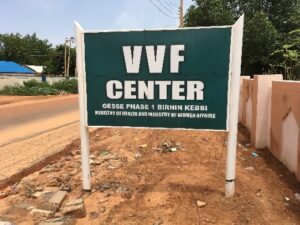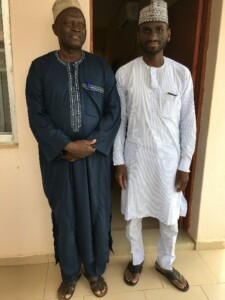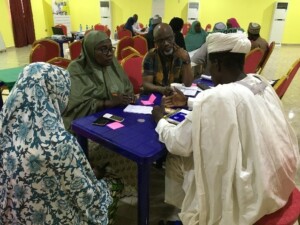A Ray of Hope for a Fistula-free Society
A Ray of Hope for a Fistula-free Society
By Morgan Mickle and Allison Annette Foster

Dr. Abubakar met us at the door dressed in traditional Kebbi dress and a warm smile that says ‘Sannun ku’ or ‘welcome’ in Kebbi’s Hausa language. Immediately, we noticed the nicely painted walls, the clean floors, and the organized well-equipped rooms. Dr. Abubakar is the Chief Medical Director of the Gesse VVF (Vesico-Vaginal Fistula) Center, located in Birnin-Kebbi, the capital of Kebbi State, Nigeria.
Dr. Abubakar has a vision of a society where there is no fistula. More importantly, he sees a world where all people have access to quality care is the norm, and each individual is treated with honor and respect. His commitment is to those most vulnerable –
Women.
Marginalized.
Poor.
Dr. Abubakar treats women and girls who suffer from obstetric fistula (OF). Obstetric fistula is caused primarily by extended labor that puts pressure on the soft tissue of the uterus until the lining breaks, leaving a hole between the wall of the vaginal cavity and the rectum and /or the bladder. The results of this complication are severe. Often the baby does not survive the birth, and the woman is left with ongoing leakage and infection, along with shame and depression. Until the VVF Center came into being, girls suffered as outcasts, stigmatized and alone, with no hope. The VVF Center has altered that fate for many girls, who can now seek kindness and support, as well as repair of their fistula.
“Women arrive feeling so depressed,” Dr. Abubakar explains. “You can see it in their faces and in the way they carry themselves. They have lost all life in their soul. Dirty, unattractive, unable to bear children, and soiled, at the peak of their young lives they have lost hope for the future.” Dr. Abubakar wants the Center’s clean and colorful surroundings, and welcoming well-trained staff to create an immediate sense of worth for these women. He couples the surgery and recovery time with healthy food, counseling, and skills training. After a month of healing at the Center, the young women and girls can travel home with some follow-up visits. “Once fully healed, these young women will be able to bear children again; fistula is just a temporary condition – not a life sentence.” says Dr. Abubakar, “And now we have added c-section services so that when they become pregnant, they can come here for safe delivery and continue to build their families without concern about further complication. All these services are free of charge because we need to remove all burdens – these women and their families have suffered too much.”

Photo Credit: Morgan Mickle
Dr. Abubakar believes that the same respect and compassion they create for patients must be mirrored among health workers. Dr Abubakar creates a positive environment for his team, treating them with dignity and fairness. The staff share his passion, commitment, and high standards. Not only that, but interns flood his Center; when we were there in September, the lab was buzzing with 11 interns. They are enthusiastic and appreciate the opportunity to train in the serious environment where each bed is made with clean sheets and a bright colored bed net, the laboratories are fully equipped and in constant use, and the clinicians and technicians are talented and tireless.

Dr. Abubakar has stepped into big shoes. His mentor, Dr. Hassan L. Wara, ‘retired but not tired,’ was the previous Center Director and still carries a strong presence at the VVF Center, and he is well respected globally, traveling to Geneva, the U.S., and throughout Africa to advocate for fistula treatment and prevention, and to teach young physicians the skills they need to perform the fistula surgery. Dr. Wara and Dr. Abubakar still have work to be done.
‘Salt cutting’ is widely practiced in Kebbi and is another cause of vaginal fistula. Young women and girls are cut, similar to an episiotomy, to make the entry of the penis easier for the man. It is referred to as a ‘salt cut’ because it creates for the woman a taste for the man – as salt makes food more pleasant to eat. Most often, a traditional barber is called in to make these cuts which can cause complications at birth, and even lead to fistula. These physicians want to end cutting, educate communities, and improve access to and quality of care.
WI-HER, is proud to be part of Dr. Abubakar’s vision. Working under Palladium as part of USAID’s Integrated Health Program (IHP), WI-HER leads gender and social inclusion on the project. As part of that work, WI-HER recently facilitated a fistula technical consultation meeting, which convened Kebbi government institutions, religious and traditional leaders, and RMNCH stakeholders to discuss how to continue integrate fistula into family planning and maternal health services so that all women access prevention, quality care, and treatment services.
USAID’s Integrated Health Program (IHP) facilitated Kebbi’s State Fistula Consultation in September 2019, from which Kebbi stakeholders formed their Advisory Group that will advance the prevention and treatment of fistula in Kebbi and aim to integrate fistula within RMNCH services. IHP is currently working in three states – Kebbi, Bauchi, and Sokoto – to strengthen health systems and improve access to and quality of RMNCH+NM and primary health care services. WI-HER shares Dr. Abubakar’s vision. We are pleased to be to be a partner working with Palladium on the Integrated Health Program in Nigeria. WI-HER will support the project leading social integration and gender mainstreaming as part of all IHP strategies.